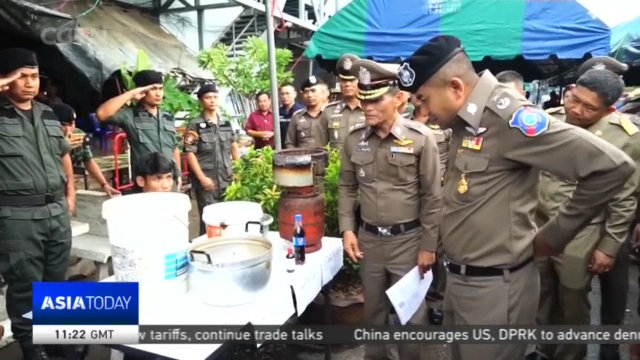
19:57, 02-Dec-2018
Asia Refugees: Undocumented migration creates shortfall in Thai healthcare funds
Updated
19:34, 05-Dec-2018
03:30

Meanwhile, in border regions of Thailand, a big rise in the number of undocumented migrants from Myanmar means state funds allocated for healthcare are no longer enough. CGTN's Tony Cheng travelled into the remote mountains to find out more.
Heading into the office is quite a hike for Dr Jinda. A regional doctor, today he's heading to the Karen village of Baan Huay Kaew. Only 20 km from the provincial capital Mae Hong Son where he's based, it's a 2-hour drive that's only possible during the dry season. The rest of the year if you get sick you have to be evacuated from the jungle bound village by helicopter.
Dr Jinda's patients are mainly stateless or undocumented migrants from the ethnic groups that populate the fluid border areas, but they all get healthcare even if he has problems understanding what ails them.
DR JINDA BORISUTHIOPATH PHYSICIAN "Communication is one of the challenges but we often solve it by planning in advance what to do and when to do it."
One of the first patients is a ninety one year old woman from the Karen tribe. She cut her foot while chopping wood and the wound is infected. Without treatment it could be a life threatening problem at her age. For her, these visits are a lifeline.
NAEGAE PRAIPARAMEE KAREN TRIBESWOMAN "My children don't take care of me, so it's only the medical team that's here to help. It always warms my heart when they come."
Dr Jinda leaves her with medicine and clean bandages paid for by the State.
TONY CHENG THAILAND "The Thai govt has been very successful in the past few decades at accommodating the millions of people who move freely across its porous border and providing them with basic services like healthcare. But in recent years, many more millions have moved across as migrant laborers, often undocumented, and that's putting huge pressure on the Thai health system and the Thai government is starting to say that enough is enough."
In Mae Hong Son Provincial hospital, they also have a policy of turning no one away even those who arrive straight from the border with Myanmar. But the huge migrant population here is putting a strain on resources. Hospital administrators say there is a fifty percent shortfall in the costs of healthcare and the funding they get. Recent crackdowns have targeted illegal migrants from Myanmar, Cambodia and Lao and while they are permitted to buy into the Thai health system, access often relies on unscrupulous employers reluctant to pay the fee. But those monitoring the system say it's not a lack of financing just how the money is distributed.
ADISORN KEADMONGKOL MIGRANT WORKING GROUP "The main problem is money management, especially on the migrant health care because now the distributed budget is based on the headcount of the population. As a consequence, the funds in border areas become unequal."
Migrant populations in Thailand are fundamentally important to the Kingdoms economy, a mainstay of industries like fishing. And while social services are available to them, many fall through the gaps. For the economic good of the nation, it's vital that healthcare is accessible to all. Tony Cheng, CGTN, Thailand.

SITEMAP
Copyright © 2018 CGTN. Beijing ICP prepared NO.16065310-3
Copyright © 2018 CGTN. Beijing ICP prepared NO.16065310-3